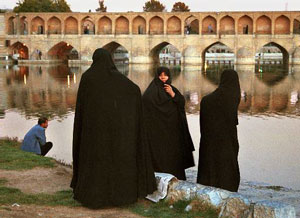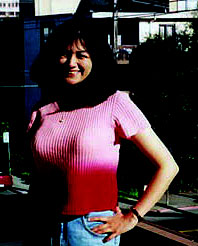



Iran: Shayesteh Zarrabi
|
Extra:
|
by Kechia Smith-Gran and Brandon Sprague
The Islamic Revolution in Iran was not televised, but Shayesteh Zarrabi
and her family had front row seats.
But while revolutionaries were running through the streets of Tehran
that February in 1979 screaming "This is the voice of the revolution
of the Iranian people! (In sedaay-e enghelaab-e mardom-e Iran ast!),"
the Zarrabis were somewhat sheltered from the chaos of conflict.
 |
| Iranian women in Isfahan, Iran, 255 miles south of Tehran. (AP photo) |
Zarrabi shares an abbreviated version of her family history. |
"Where we were living there wasn’t so much of street fights
and these things," Zarrabi, who was five years old at the time, recalled.
"I remember one day, my mom said, ‘OK, let’s go to one
of the rooms in the back because there are bullets here.’ "
Still, to a young girl, Zarrabi said, the events as they unfolded didn’t
seem all that serious.
After the revolution, she said, life went on very much as it had, save
for some minor changes.
"I remember that my teacher at school wasn’t wearing scarves,
and after some days she was wearing them," Zarrabi said.
But things, she said, were not overly oppressive under the new theocracy
headed by religious leader Ayatollah Khomeini -- especially for a five-year-old.
During an interview at a Berkeley café, Zarrabi even shared one
story that sent her into a fit of laughter.
She also had to learn a new national anthem.
Zarrabi, her sister, and parents continued to live in their apartment in downtown Tehran. The apartment had actually been a small day clinic that her father, armed with plans he had brought back from London where he was a student, built with the hopes of expanding his child psychiatry practice.
When it failed to draw any clients – Zarrabi said the idea of psychiatry
has yet to take off in Iran -- the family moved in instead.
Her father's family started out as metal smiths in Isfahan generations
ago. Zarrabi, whose namesake means "coin maker," says that her
ancestors chose the trade because they weren’t cut out to be fighters.
The Zarrabis soon moved from Isfahan – Persia’s majestic, monument-laden
former captial – to Tehran, the bustling, modern one. The well-educated
family often traveled far outside Iran to Europe and England before the
revolution. When the Islamic Republic first took control, travel was restricted
to nearby countries such as Turkey and Cyprus.
 |
| The Iranian flag. |
Zarrabi sings the Iranian national anthem. |
The Zarrabis were advocates of higher education for their daughters.
Both Shayesteh and her sister have numerous advanced degrees.
Zarrabi is a voracious student. Her bachelor’s and one master’s
degree in English translation are from a private Iranian university, but
she also has an additional master’s in linguistics from Edinburgh
University in Scotland.
Today Zarrabi is a friendly, refreshingly unaffected woman living in
Berkeley. She is quick to smile or laugh. She is currently enrolled at
Vista Community College studying computer graphic design.
She said she is not exactly what she would describe as a typical Iranian
woman.
"It's very, very hard to say because actually in Tehran, the capital,
no, I'm very traditional for a girl in the capital. I mean compared to
girls in other provinces, I'm very modern, so it's very hard to say what
I am," Zarrabi said.
According to NetIran, 98 percent of women over the age of 21 are married,
and at 29, Zarrabi said her parents are pressuring her to get married.
But she said she has different plans for her life, even though marriage
may actually mean more freedom in a way.
"In Iran, your social status can actually raise after you’re
married because you can do so many things on your own," said Zarrabi.
"They [society]sort of support you because girls are supposed to
depend on getting married, so they don’t let your spread your wings."
In Iran, educational affairs experts realize that for many, education
is the key to independence. Mahnaz Hosseini, a female psychoanalyst, said
she finds this to be true.
 |
| Shayesteh Zarrabi's family came from Isfahan. |
Zarrabi recites a poem by Sa'di. |
"I believe that this is main reason that girls are attracted to
university… they have the opportunity to live away from home and
to be independent," Hosseini said .
Shayesteh sees independence and freedom as very important to her as
she pursues her life here. While her parents pushed a good education,
they still expected her to follow tradition and get married.
Her mother, Zarrabi said, told her that there were many Iranian men here
in the U.S. because their families fled Iran in 1979, so she could marry
in the U.S. Zarrabi’s sister married an Iranian American after a
brief courtship.
"Before I came here my mom was basically insisting that my sister
find a guy for me and introduce him to me," Zarrabi said, laughing.
She laughed quite a bit harder when she offered the kicker: "She
[my sister] did a good job. She told my parents and said ‘let her
come, let her come,’ and after I was here she said ‘no.’
As for the future, Zarrabi said she is still working on that. "I
mean my final goal is going back to Iran at some point, but it wouldn’t
be now," she said, citing a desire to travel more, perhaps visit
Mexico.
Zarrabi's hopes for the future have a scope outside of herself as well.
She said that she wants to see her home country change a bit, with the
status quo changing to be more inclusive.
"I mean older people should also accept a New World," Zarrabi
said. "I would like Iran to be sort of like India, I mean because
the world has changed and … there's just some resistance does create
a tension for the time being in Iran. So, I really wish the transition
would take place smoother," she said.
"India actually has been changed drastically in the last 15 years,
so I hope the same for Iran. I mean, the new generation we can live happier,"
Zarrabi said.
While sharing memories of her life in Iran with her plans for her future,
Zarrabi was at times light and carefree, and at others more introspective.
She recited a poem by the famous 13th century poet Sa’di that cautions
people to be careful not to kill the lowly ant. As she talked, her voice
rose and fell with the rhythm of the words, and her face lit up. It was
if, in a roundabout way, she was sharing her personal philosophy. [AUDIO:
IRAN4.MOV with PHOTO isfahan.jpg]
"It says don’t kill the ant because it’s an animal by itself and it’s very hard working," she said. "It concludes, don’t do any harm to people who are weak because one day you will be weak too. And at the end, of course, God is forgiving of those who are very kind."
